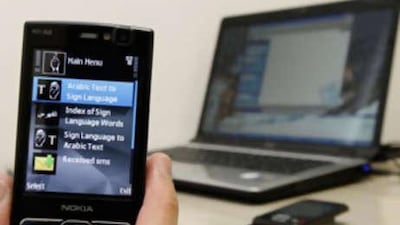An Emirati computer whizz has developed software that enables the hearing and speech-impaired to text each other in standard Arabic sign language using their mobile phones.
His mobile phone application, which helps users translate texts into short sign language videos, and vice versa, could prove particularly helpful for deaf people who had trouble reading, said Faisal al Ameiri, 24 and a student at Khalifa University's Sharjah campus. "If you meet a deaf person and the person doesn't understand a word you have written, you can write that word and translate it to a video," Mr al Ameiri said. "So then the deaf person can understand what you're trying to say."
Although visual communication applications such as iSign already exist for iPhones, those applications are mostly for American sign language. There are also video conferencing options, but they are expensive. When Mr al Ameiri, a computer engineering student, realised that many deaf people on the east coast also had trouble reading, it further strengthened his resolve to devise a new tool that they could use to communicate.
"I thought about SMS texting, but when I searched and went to some community centres in Khor Fakkan in the beginning of the year, the people there told me many of the [deaf people] don't know how to read text," he said. "They told me they don't use any standard sign language. They just express words in their own way. I thought if I do this project, it would be a good idea that would be useful for them."
For his prototype, Mr al Ameiri uploaded about 200 videos. He took the examples from a Saudi Arabian website and secured permission to use the recordings, grouping them by type on his application. "You can search on your phone for what's available, categorised by like food, transportation, family words," Mr al Ameiri said. "Then you can watch the video." The potential educational benefits of the mobile phone application has already attracted attention from local special needs groups.
Hamad al Darmaki, a prominent member of the Emirati deaf community who is working to establish an association for the deaf in the UAE, contacted Mr al Ameiri several weeks ago. Dr Jill England, a special education consultant at the Zayed Higher Organisation for Humanitarian Care and Special Needs, also wanted to know more. "What I see with the students is, of course, they're always texting back and forth to each other on cellphones," said Dr England, who works with teachers and speech therapists who instruct deaf students at the centre.
She was excited about the possibilities for bringing sign language to devices as accessible as mobile phones. "This could be particularly good for young children or students that have difficulty reading." The Zayed Higher Organization has about 80 hearing impaired children in Abu Dhabi, and another 25 in Al Ain. One challenge at the moment is in helping students with "communication difficulties" to better communicate with peers and teachers inside and outside the school. "The app you mentioned would be a wonderful solution to this barrier," she said.
Mr al Ameiri, who wants to become a computer programmer, recently won Dh10,000 for his mobile application in a contest hosted by Khalifa University. He hopes to improve the project and secure a grant to further aid in development, but those plans may have to wait. "The Khalifa Fund approached me and said they wanted to set up a meeting to see if we can market this application and use it," he said. "The problem is I told them maybe it will have to be later. I have exams now."
mkwong@thenational.ae

